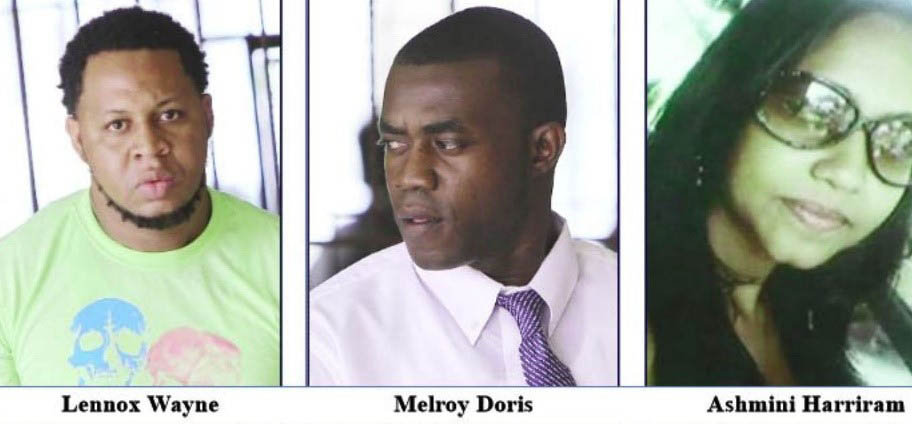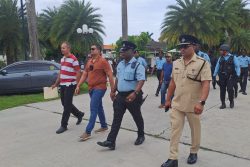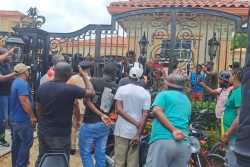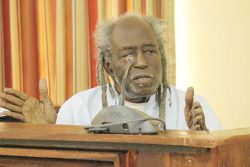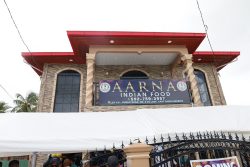High Court judge Navindra Singh has ruled that murder accused Lennox Wayne, called ‘Two Colours,’ will not be granted a stay of the capital indictment currently against him, since his right to a fair hearing has not been breached as he sought to contend.
As a result, Wayne, who is currently on remand, will have to face a jury to answer the charge levelled against him for the 2014 murder of Lusignan beautician Ashmini Harriram.
He had applied to the High Court to grant him bail while it considered his application for the capital charge against him to be stayed, arguing that his right to a fair and timely hearing has been violated.
In his judgment, delivered yesterday, however, Justice Singh found that this was not the case.
In 2017, Wayne and his then co-accused Melroy Doris had faced trial for the young woman’s murder, but there was a hung jury, resulting in the need for a new trial.
Doris has since pleaded to the lesser offence of manslaughter and is currently serving time behind bars.
In a Fixed Date Application (FDA), Wayne said that while his case had repeatedly been listened in successive assizes since 2017, the Director of Public Prosecutions (DPP) failed to commence any new trial.
Wayne who describes himself in his FDA as an ex paid informant for the police, had said that his name had been listed for trial every year since then, but that all his attorneys’ requests of the DPP for the matter to be heard have proven futile.
Referencing Article 144 (1) of the Constitution, which provides for a fair hearing within a reasonable time, the judge said the Court needed to determine whether there had in fact been undue delay in the prosecution of the case against the accused.
Citing a plethora of case law authorities and statutes, the judge said that the 33-month period for a retrial is not unreasonable, especially when considering the fact that the DPP had averred that the state was prepared to proceed with the trial in January, 2021.
The judge also noted the constraints brought on by the Coronavirus pandemic, which had placed a temporary halt on jury trials, with multiple accused persons in one case.
From the factual matrix of the action, Justice Singh also cited Wayne’s indication on several occasions of his desire to plead guilty to the lesser offence of manslaughter and in fact actively engaging in discussions about such a plea with the DPP.
This, the judge said, effectively waived any period of delay prior to such indication.
On every occasion, after indicating his willingness to plea, Wayne had a change of heart.
Attorney Nigel Hughes, who represented Wayne, had argued that he was ready to proceed with the trial during the time that discussions regarding the Applicant pleading guilty to manslaughter were ongoing and that the DPP was therefore still charged with the responsibility of proceeding with the retrial.
Justice Singh, however, said that he did not find the argument to be tenable since consideration must be given for the fact that there is a process involved in the preparation of a trial, including notifying witnesses and, therefore, the DPP cannot be expected to be in a state of preparedness to instantly commence the trial.
On this point, the judge made the observation that at the time the DPP was prepared to proceed with the trial back in January, the Applicant’s indication of willingness to plead guilty to manslaughter and forego a trial is diametrically opposed to his claim that his right to a trial within a reasonable time has been infringed, “particularly when he shortly thereafter instituted this FDA.”
In all the circumstances, the judge said he found the Applicant’s right to a fair hearing within a reasonable time as provided for in Article 144 has not been infringed.
Regarding Wayne’s request for a permanent stay of prosecution, Justice Singh noted that this was based on his claim that there had been an unreasonable delay in the prosecution of his retrial.
Having, however, found that there had been no such delay, the judge, citing further legal authorities, said that a proper application of principles enunciated therein, leads to the irrefutable conclusion that there is no justifiable reason for the grant of a stay.
“As long as a fair trial is possible it is in the public interest that cases should be tried,” the judge noted in his ruling.
In the circumstances, the Court dismissed Wayne’s application, and ordered the DPP to present the indictment against him for trial within 30 days of yesterday’s ruling.
Costs were awarded to the Attorney General (the Respondent) in the sum of $200,000 which has to be borne by Wayne.
Wayne and Doris were accused of murdering Harriram, called “Munesha,” on July 10th, 2014, at Lusignan Railway Embankment, East Coast Demerara.
On March 11th, Doris was sentenced to five years in prison, following his plea to manslaughter.
Doris, a former taxi driver, according to a caution statement (CS) that he did not deny giving to the police, had said that on the day in question, he was hired by Wayne, who asked to be transported to Lusignan.
Upon arrival in the area, Doris said they passed two girls at a corner and just then Wayne asked him to stop the vehicle.
According to Doris’ statement, which had been read to the court, after the vehicle came to a halt, “Two Colours” whipped out a gun, exited the car, and shot one of the two girls.
It was Harriram who was fatally wounded.
Doris had said that after the shooting, “Two Colours” returned to the car, placed the gun to his head, and ordered him to drive.
According to a caution statement, which police say Wayne gave to them, however, he alleged that Doris had approached him with the hit. Wayne, however, vehemently denied ever giving the statement to police.
The court had heard from the CS that Doris, with whom Wayne had become acquainted one month before the killing, told him of a “work” he wanted him, [Wayne] to get done.
The statement detailed Wayne as saying that after joining Doris’ car on the day in question, Doris retrieved a nickel-coloured handgun from beneath the seat and handed it to him.
After arriving at a location at Lusignan, the court had heard that Doris had pointed out one of two girls to Wayne, drove close to where they were and stopped the car and Wayne then exited and shot Harriram in the head, before grabbing her cellphone.
According to the statement, Wayne allegedly said they then fled the scene. He also reportedly said that Doris had promised to pay him $2.5 million for the job, but he never received any money.
